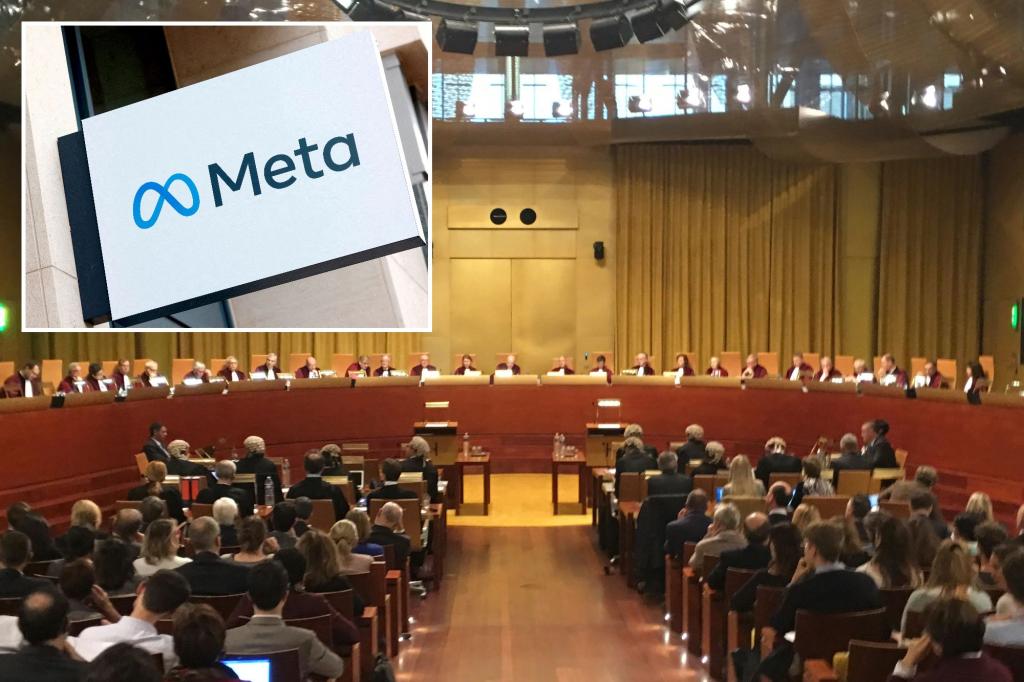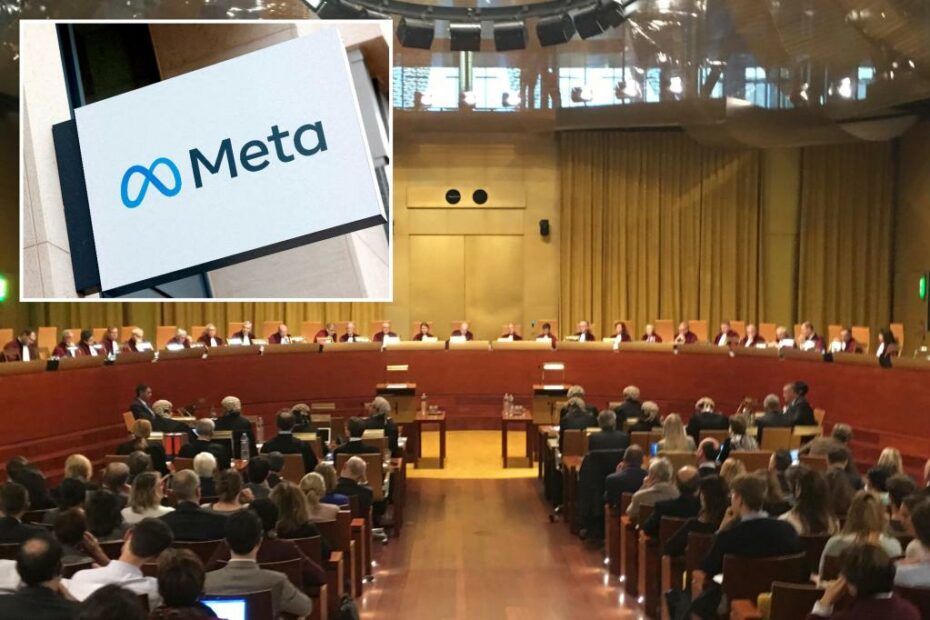Meta loses as top EU court backs antitrust regulators over privacy breach checks
Europe’s top court has given its backing to the power of German antitrust regulators to investigate privacy breaches, in a blow to Meta Platforms and its business model. The Court of Justice of the European Union (CJEU), based in Luxembourg, ruled in favor of the German cartel office’s order in 2019 that Meta (formerly known as Facebook) should cease collecting user data without their consent, deeming it an abuse of market power. The case hinged on whether the antitrust agency had exceeded its jurisdiction by addressing data protection concerns, which fall under the responsibility of national data protection authorities. Meta, which gathers user data for behavioral advertising, challenged the order, leading a German court to seek advice from the CJEU. A spokesperson for Meta commented, “We are evaluating the Court’s decision and will have more to say in due course.”
The CJEU judges stated that in antitrust investigations, it may be necessary for the competition authority of the member state concerned to examine whether the conduct of a company complies with rules other than those related to competition law. However, the court also emphasized that antitrust regulators must take into account any decision or investigation made by the relevant supervisory authority in accordance with data protection regulations. The German cartel office welcomed the ruling, with its head, Andreas Mundt, highlighting the importance of data in establishing market power and describing the use of personal data by large internet companies as potentially abusive under antitrust law. Benoit Coeure, head of the French competition agency, referred to the ruling as a landmark decision regarding data protection as a competition parameter.
Legal experts expressed mixed opinions on the potential implications of the ruling. Thomas Graf, a partner at Cleary Gottlieb law firm, urged caution, suggesting that antitrust authorities would need to demonstrate the relevance of privacy law to antitrust cases and coordinate their actions with GDPR authorities. The General Data Protection Regulation (GDPR) is an EU law that sets privacy and security requirements for organizations that target or collect data related to individuals in the EU. Graf questioned whether antitrust authorities would become GDPR regulators, stating that he did not believe this would be the case. Privacy activist Max Schrems, who has filed complaints against Meta, viewed the judgment as a positive development for his ongoing litigation against the company.
FAQs:
Q: What is the significance of the CJEU ruling on Meta Platforms?
A: The CJEU ruling supports the power of German antitrust regulators to investigate privacy breaches, a decision that directly affects Meta Platforms (formerly Facebook). The case revolves around the German cartel office’s order for Meta to stop collecting user data without their consent, which Meta challenged. The ruling validates the jurisdiction of antitrust agencies to address data protection concerns, potentially opening the door for further investigations into Big Tech companies.
Q: Why did the CJEU rule in favor of the German cartel office?
A: The CJEU acknowledged that in antitrust investigations, it may be necessary for competition authorities to examine whether a company’s conduct complies with rules beyond those related to competition law. The court stressed the importance of considering decisions and investigations made by the relevant supervisory authority regarding data protection regulations. This ruling supports the German cartel office’s efforts to prevent the abuse of market power through unauthorized data collection.
Q: How does this ruling impact Meta’s business model?
A: Meta’s business model, which relies on gathering user data for behavioral advertising, may face increased scrutiny as a result of this ruling. The CJEU’s support of the German cartel office’s power to investigate privacy breaches could give antitrust authorities more leeway in conducting probes into Big Tech companies. Meta will need to reassess its data collection practices to ensure compliance with antitrust and data protection regulations.
Q: Can antitrust authorities become GDPR regulators?
A: The ruling has sparked debate among legal experts over whether antitrust authorities will assume the role of GDPR regulators. Some experts, such as Thomas Graf from Cleary Gottlieb law firm, expressed skepticism, emphasizing that antitrust authorities would need to demonstrate the relevance of privacy law to antitrust cases and work in coordination with GDPR authorities. The General Data Protection Regulation (GDPR) remains the primary legislation governing data protection in the EU.
Q: How does this ruling impact privacy activists?
A: Privacy activists, including Max Schrems, who has filed complaints against Meta, view the CJEU’s decision as a positive development for their ongoing litigation against the company. The ruling supports their claims that unauthorized data collection by tech giants like Meta can be abusive under antitrust law. The judgment may strengthen the position of privacy activists in their fights for stronger data protection measures.

EU Court Upholds Antitrust Regulators in Favor of Privacy Breach Checks, Dealing a Blow to Meta
Meta Platforms suffered a major blow on Tuesday as Europe’s top court upheld a German data cur order that directly challenges its business model. The Court of Justice of the European Union (CJEU) ruled in favor of the German antitrust watchdog, affirming its authority to investigate privacy breaches. This ruling could potentially grant antitrust authorities greater flexibility in their investigations into Big Tech companies.
The case revolved around a directive issued by the German cartel office in 2019, which ordered Meta to cease collecting user data without consent, citing it as an abuse of market power. The key question was whether the German antitrust agency had overstepped its jurisdiction by addressing data protection concerns, which typically fall under the purview of national data protection authorities. Meta, the parent company of Facebook, Instagram, and WhatsApp, vigorously contested the decision, leading a German court to seek guidance from the CJEU.
In response to the CJEU’s ruling, a Meta spokesperson stated that the company is evaluating the decision and will provide further comment in due course. The ruling highlights the importance of antitrust investigations in scrutinizing not only competition law compliance but also potential violations of other rules. However, the CJEU also emphasized that antitrust regulators must take into consideration decisions or investigations conducted by relevant supervisory authorities involved in data protection regulations.
The German cartel office welcomed the ruling, with its head, Andreas Mundt, emphasizing the crucial role of data in determining market power. Mundt stated that the use of consumers’ personal data by major internet companies can be abusive under antitrust law. His counterpart at the French competition agency, Benoit Coeure, hailed the ruling as a significant decision that recognizes the relationship between data protection and competition parameters.
Thomas Graf, a partner at Cleary Gottlieb law firm, urged caution regarding whether antitrust authorities would delve into the intricacies of privacy law. Graf indicated that demonstrating restrictive effects and abuse, along with coordination with GDPR (General Data Protection Regulation) authorities, would be necessary for antitrust law to address privacy concerns. The GDPR is a comprehensive privacy and security law that imposes obligations on organizations collecting or targeting data of individuals in the EU.
While some experts speculate about potential overlaps between antitrust and privacy regulations, Graf believes that antitrust authorities are unlikely to assume the role of GDPR regulators. It is important to note that privacy activist Max Schrems, who has filed complaints against Meta, considers this judgment advantageous for his ongoing legal battles with the company.
